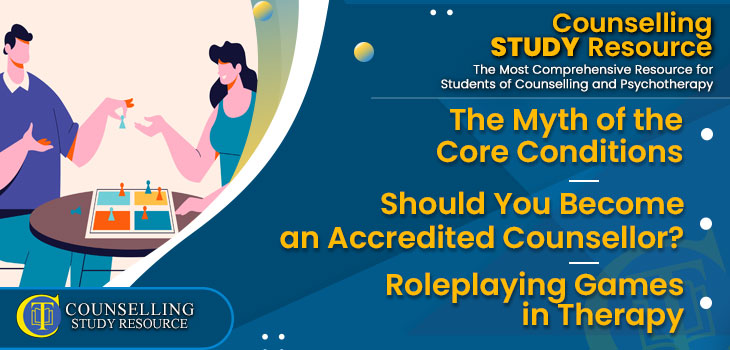272 – Roleplaying Games in Therapy
The Myth of the Core Conditions – Should You Become an Accredited Counsellor?
NOTE: The Counselling Tutor Podcast is a free resource, which is available on the main Counselling Tutor website. We also place it in CSR for your ease of access. Unlike our other CSR resources, podcast episodes may include presenters’ opinions, and are not intended to be referenced for academic use.
In Episode 272 of the Counselling Tutor Podcast, your hosts Rory Lees-Oakes and Ken Kelly are back with our latest three topics:
- Firstly in ‘Student Services’ we look at the myth of the core conditions.
- Then in ‘Ethical, Sustainable Counselling’, Rory and Ken discuss reasons you might, and might not, look into becoming an accredited counsellor.
- And lastly in ‘Practice Matters’, Rory speaks with Daniel Hand about using roleplaying games in therapy.
The Myth of the Core Conditions [starts at 03:12 mins]
Counselling Foundations is sponsored by
Counselling Skills Academy
Learn counselling techniques by seeing counselling skills used in real sessions by qualified therapists.
Real sessions - real-life presentations - real skills.
In this section, Rory and Ken discuss a common misconception about the phrase ‘core conditions’, and where you might want to be careful when mentioning it in your assignments:
- The core conditions vs. the 6 necessary and sufficient conditions for therapeutic change.
- While Carl Rogers spoke a lot of empathy, congruence and unconditional positive regard, he didn’t coin the phrase ‘core conditions’ – that was Robert Carkhuff.
- ‘Facilitative conditions’ is a better phrase to use in assignments when referring to the 3 conditions.
- Person-centered therapy was first rooted in social work.
- These are transferable skills, regardless of what you choose to do career wise.
- The 3 core/facilitative conditions (empathy, congruence and unconditional positive regard), are all work done by the counsellor, it is the counsellor who demonstrates these within the relationship. Whereas when we look at the 6 conditions, the other 3 conditions relate to the client, and how they are receiving those first conditions.
- They aid in creating and forming trust within the therapeutic relationship.
- They can be considered ‘central therapeutic ingredients’.
- Carl Rogers found the 6 conditions that are necessary to bring about psychological change, but the actual term ‘core conditions’, sits outside of Carl Rogers – be careful not to trip up on this in your assignments.
A handout on The Core Conditions is available for download in the green button above.
Should You Become an Accredited Counsellor? [starts at 20:31 mins]
Becoming an accredited counsellor is a personal choice, one that should be carefully considered. In this section, Rory and Ken look at both the reasons you may become an accredited counsellor, and also the reasons it might not be something you feel you need to do:
- An accreditation is an exam of sorts – submitting a portfolio of evidence responding to questions and seeing if you qualify to be accredited.
- Being accredited means you become accountable for your practice to your ethical body.
- Some work environments might require you to become accredited e.g. the NHS.
- Or you may undergo this process just to have your practice overlooked by a critical friend and therefore give you an indication that your practice is of a standard to become accredited.
- It’s a completely personal choice unless you're asked by an employer.
- The process comes with fees.
- Being accredited can look attractive to a client if you are on a register that displays those who are accredited vs. those who are not.
- However, if you're running a private practice and/or rely on referrals, it’s unlikely that a client will know what accredited means, or its significance.
- It’s about deciding what is best for you and your practice.
Roleplaying Games in Therapy [starts in 34:06 mins]
The National Counselling Society is proud to sponsor Practice Matters.
NCS are really excited to have launched their Children and Young People Therapist Register for counsellors working with the younger age group.
In this week’s ‘Practice Matters’, Rory speaks with Daniel Hand about the use of roleplaying games in therapy, and his new book Role-Playing Games in Psychotherapy: A Practitioner’s Guide.
The key points of this discussion include:
- RPG Therapy – using roleplaying games such as Dungeons and Dragons.
- By using roleplaying games in therapy, it becomes the fictional character who has the problems, who is taking the risks and who will be dealing with the repercussions of their actions.
- It allows the client to address their problems through a third party.
- This method of therapy can work with clients of any age group – it is something fun and enjoyable for the client.
- Roleplaying games in therapy feel safe – they add a degree of distance.
- Working with autistic clients – they can play as whoever they want to be. They can be themselves or try out different versions of themselves without punishment or judgement.
- There will always be parts of the client within their character – creating openings for conversation and discussion.
- Daniel’s book works as a beginners guide for using roleplaying games in psychotherapy.


